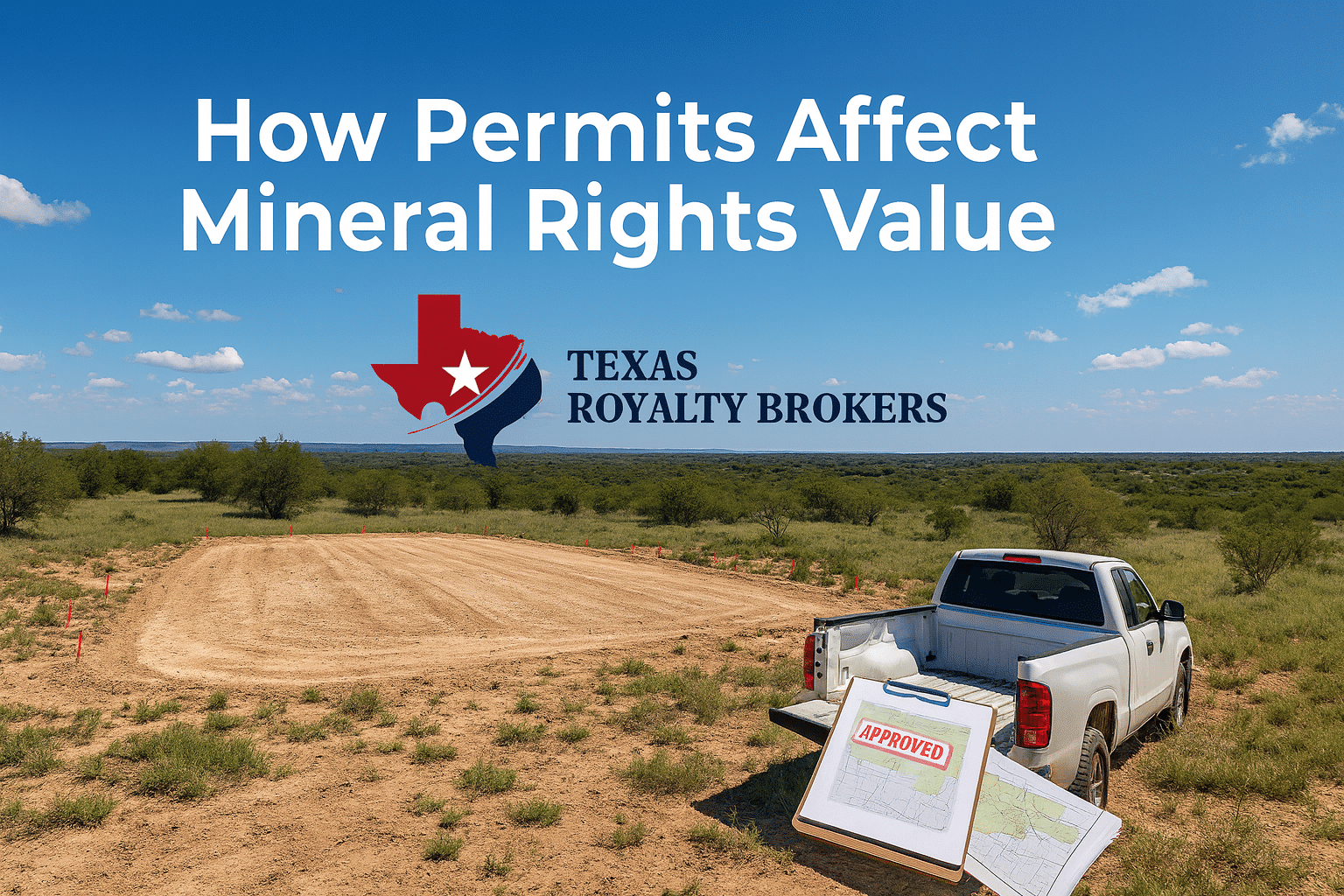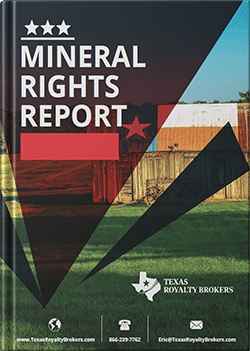Why Texas Royalty Brokers?
sellers
Buyers
State Specific Guides
Resources
Oil and Gas Permits: A Mineral Owner’s Guide
If you’ve heard there’s a permit filed on your mineral rights, or you’re just trying to understand what that even means, you’re in the right place.
A drilling permit is one of the strongest signs that an operator is planning to drill. It’s a big step forward in the development process, and it can have a major impact on the value of your mineral rights.
For many owners, this is the first real indication that activity is headed their way.
But what exactly is a permit? How do you know if one’s been filed on your property? And why does it matter so much to potential buyers?
In this post, we’re breaking down everything you need to know about oil and gas permits.
You’ll learn how to check if your minerals are permitted, what a permit signals to the market, how it affects your mineral value, and whether or not this might be the right time to consider selling.
At Texas Royalty Brokers, we track permit filings across Texas every day and help mineral owners make smart decisions based on real data. Let’s take a closer look at how permits work and what they could mean for your bottom line.
What Is an Oil and Gas Drilling Permit?
An oil and gas drilling permit is an official approval from the state that gives an operator the right to drill a well in a specific location. In Texas, permits are issued by the Railroad Commission, but every oil and gas producing state has its own agency that handles the process.
Think of it as the green light before a company can move forward with drilling. Without a permit, no drilling can take place.
Filing for a permit usually comes after the operator has already leased mineral rights, studied the geology, and decided that the area has strong potential for production.
For mineral owners, a permit is a big milestone. It signals that the operator has invested time, money, and effort into planning a well.
While it does not guarantee drilling will happen, it shows much stronger intent compared to just leasing acreage. This is why the filing of a permit often causes a noticeable increase in the market value of mineral rights.
How to Know If Your Minerals Are Permitted
If you own mineral rights, one of the most important things you can do is keep track of whether a permit has been filed on your property. The tricky part is that permits are not always obvious unless you know where to look.
In Texas, drilling permits are filed with the Railroad Commission of Texas (RRC). Their online database lets you search by operator, county, or even specific survey details. If you are comfortable digging through records, you can usually find out whether a permit has been approved.
That said, permits can be hard to spot for most mineral owners.
Operators often file dozens or even hundreds of permits across large areas, and sorting through the technical data can be overwhelming. On top of that, just because there is a permit nearby does not always mean it applies to your exact tract.
In addition, a permit may be filed next door to you so it does show up in a search, but the well bore goes directly through your acreage.
Signs a Permit Has Been Filed
One of the easiest ways to tell something is happening with your minerals is when you suddenly start receiving a flood of offers in the mail or by phone.
Mineral buyers track permits closely, and as soon as one is filed they move quickly to contact owners. If your phone is ringing more than usual or your mailbox is filling up with offers, it is a strong signal that a permit has been filed or is about to be filed in your area.
This is often the first sign mineral owners notice even before they look at state databases. If you are getting more attention than usual, it is worth digging deeper to confirm whether your minerals are permitted.
How Texas Royalty Brokers Can Help
Sorting through permits and figuring out if your specific minerals are included can be confusing. That is where Texas Royalty Brokers comes in. We monitor permits across Texas every day and can quickly confirm whether your property is permitted.
If you think there might be a permit on your minerals, contact us for a free consultation. We can verify the details, explain what it means for your value, and walk you through your options. Many times this stage is one of the best opportunities to sell, and having professional guidance ensures you are not leaving money on the table.
What a Permit Signals to Mineral Buyers
When a drilling permit is filed, it sends a strong signal to the market.
For buyers, a permit means the operator has completed leasing, run geological studies, and invested money to move a project forward. It is one of the clearest indicators that drilling is likely in the near future.
When a permit is filed, buyers often become much more aggressive with their offers. The risk is lower than in the leasing stage because the operator has shown real intent to drill. Buyers know that if the well gets drilled and produces, royalty income will follow.
At the same time, a permit is not a guarantee.
Operators sometimes delay drilling, cancel permits, or let them expire. That lingering risk is why value at the permit stage is often very strong but still not quite at the peak compared to a drilled but uncompleted (DUC) well.
For mineral owners, the permit stage often brings a rush of interest from buyers who want to secure your rights before the drill bit hits the ground.
How Permits Affect Mineral Rights Value
Once a drilling permit is filed, the value of your mineral rights usually increases. The reason is simple.
Buyers are no longer just speculating on whether drilling will ever happen. A permit shows that the operator has taken a serious step toward turning those minerals into producing wells.
For buyers, this reduces risk. They are willing to pay more because the chance of future royalty income has improved. In some cases, a permit can push mineral values up significantly compared to what an owner might have received when the property was only leased.
It is important to remember, though, that permits do not eliminate risk.
Drilling can still be delayed or canceled. If that happens, the value of your mineral rights can drop quickly. Buyers know this too, which is why offers at the permit stage are strong.
For many mineral owners, the permit stage is one of the best times to sell mineral rights. It strikes a balance between high market demand and still having some uncertainty that keeps buyers competitive.
How Long Do Drilling Permits Last — State by State Guide
Permit expiration rules vary depending on where your minerals are located.
Here is what mineral owners should know in some of the most active oil and gas states.
Texas: For mineral rights ownership in Texas, drilling permits are valid for two years from the date of approval. If a well has not been spudded (drill bit hits the ground) within that time, the permit expires and the operator must reapply. This means mineral owners in Texas often see a window of increased value for up to two years once a permit is filed.
Oklahoma: Oklahoma mineral rights owners should know that permits generally require drilling operations to begin within about six months. If no work has started, the permit may become void, although extensions are sometimes possible. This shorter timeline can create a quicker swing in value for mineral rights ownership in Oklahoma compared to other states.
North Dakota: For mineral rights in North Dakota, drilling permits expire one year after they are issued unless drilling has begun or the well has been drilled below the surface casing. This one year clock is important for North Dakota mineral rights owners because value tied to a permit can disappear quickly if the operator fails to act.
New Mexico: In New Mexico, mineral rights ownership benefits from a slightly longer permit window. Drilling permits are usually valid for two years, giving operators more time to get rigs in place. For New Mexico mineral rights owners, this can mean more buyer interest over a longer period once a permit is on file.
Colorado: Colorado mineral rights owners also fall under a two year expiration timeline for most drilling permits. If drilling does not begin within that period, the permit becomes invalid. Just like in Texas and New Mexico, this can create a strong but temporary increase in the value of Colorado mineral rights once a permit is active.
Wyoming: For Wyoming mineral rights owners, drilling permits are valid for two years from the date of approval. If drilling has not started within that period, the permit expires and the operator must reapply. This two year window is similar to Texas, New Mexico, and Colorado. For mineral rights ownership in Wyoming, a permit usually means higher value for a limited time, but that value can disappear if the operator does not move forward.
Louisiana: Mineral rights in Louisiana are more complex. The rules can vary by parish and depend on the type of well being drilled. Because Louisiana does not have a single standard expiration timeline, mineral rights owners in Louisiana often need help interpreting what a specific permit means for their property.
No matter the state, the key takeaway is that permits have a shelf life.
For mineral rights owners, the filing of a permit is a sign of increased value, but that value is tied to a ticking clock.
If the operator drills, the upside continues. If the permit expires, value can fall quickly. Understanding your state’s permit rules is critical, and working with an experienced broker like Texas Royalty Brokers ensures you know exactly where you stand.
Risks of Holding After a Permit Is Filed
While a drilling permit is a strong signal that value is increasing, it also comes with risk.
Many mineral owners assume a permit guarantees drilling, but that is not always the case. Operators sometimes change plans, delay activity, or even allow permits to expire. When that happens, the boost in value tied to the permit can disappear almost overnight.
At this stage, holding on to your minerals is a straight gamble. You are betting that the operator will follow through and drill. If they do, you may see royalty income in the future. If they don’t, your mineral rights value can fall back down to pre-permit levels.
Another risk is timing.
Even if an operator does move forward, they may not drill immediately. Oil prices, equipment availability, and company budgets all play a role in when a rig actually shows up. During these delays, your mineral rights are tied up in uncertainty, which can limit your ability to get strong offers later.
Market conditions can also shift. A permit filed during a high oil price environment may drive aggressive offers, but if prices drop before drilling begins, buyers will become more cautious.
For mineral rights owners, the permit stage is best understood as an opportunity with a ticking clock.
Selling now means locking in strong value while the market is hot. Holding means gambling on future activity, and like any gamble, the outcome is never guaranteed.
Should You Sell When a Permit Is Filed?
For most mineral owners, the permit stage is one of the very best times to sell. The reason is simple. Buyers are willing to pay a premium because the risk has dropped significantly compared to earlier stages, but the well has not yet been drilled or put into production. That balance between higher value and lingering uncertainty creates competition among buyers and drives offers up.
If you wait too long, you risk missing this sweet spot.
Once the well is drilled and producing, buyers no longer pay for the “what if” upside. They look strictly at decline curves and predictable royalty income, which usually means lower offers. On the other hand, if you hold and the operator decides not to drill, the value of your minerals can fall sharply.
That is why mineral rights owners should very strongly consider selling when a permit is filed. It is often one of the moments when your minerals will attract the most attention and the highest offers, without the gamble of waiting to see if drilling actually occurs.
At Texas Royalty Brokers, we specialize in helping mineral owners capture this window of opportunity. By connecting your property to a network of competitive buyers, we make sure you get the strongest offers available at the permit stage.
Texas Royalty Brokers Helps You Maximize Permit-Stage Value
Navigating the permit stage on your own can be overwhelming. Between tracking filings, understanding expiration dates, and sorting through offers, it is easy to feel like you are guessing about what your minerals are really worth.
That is where Texas Royalty Brokers can make all the difference.
We monitor permits across Texas and other producing states every single day. When a permit is filed on your property, we know how to confirm the details, explain what it means for your value, and quickly bring your minerals to serious buyers who are ready to compete for them.
The result is simple. You get multiple offers, stronger prices, and a clear understanding of your options without the stress of trying to figure it out on your own. Many mineral owners who contact us during the permit stage end up walking away with far more money than they ever expected.
If you believe your minerals may be permitted, reach out for a free consultation. We will review your situation, confirm the facts, and guide you through the process of securing top dollar for your mineral rights.
Closing Thoughts
For mineral owners, the permit stage is often one of the best opportunities to sell. Value is high, buyer demand is strong, and you are not left gambling on whether drilling will ever happen. Waiting too long can mean missing out, especially if the operator delays or the permit expires.
At Texas Royalty Brokers, our job is to help you make the most of this window.
We track permit filings, understand how they impact value, and connect you with competitive mineral buyers so you walk away with the best possible outcome.
If you think your minerals may be permitted, do not wait. Contact us today for a free consultation and let us show you what your mineral rights are worth in today’s market.






